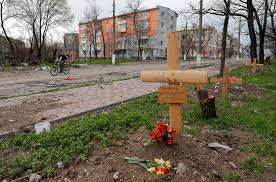“The Gnashing of Alyosha Karamazov’s Teeth”
In a miraculous development, the novice monk, Alyosha Karamazov, has come back to life in the 21st century. Although the world has changed in countless ways, he still labors under the weight of his brother Ivan’s brutal rant about the evil lurking within the human soul. Worse still, Alyosha has rejoined the human race at a moment when information is pouring in about Russian atrocities in Ukraine. The fate of the maternity hospital documented in “20 Days in Mariupol” challenges his faith in a way that even Ivan could not imagine. How could a merciful God allow for such horrors!

Wracked by a sudden loss of faith in his Creator, Alyosha throws his Bible in the waste can and leaves the monastery—and his God! —for good, and then commits himself to seeking consolation in alternative perspectives on the human condition. Luckily, a wise man provides him with three secular approaches that could offer lessons about finding hope in dark times: Roy Scranton’s, “Raising my Child in a Doomed World”; Jean-Paul Sartre’s “The Wall,” and Samuel Sheffler’s, “The Importance of the Afterlife.”
Alyosha sits down at his desk, and reads each article carefully.
Assignment:
In a world where God seems to be absent, which one of these three writers will offer Alyosha the most persuasive guidance about finding hope in the face of unspeakable tragedies, such as those in Mariupol?
Please respond to this question in a typed, double-spaced essay of no more than five (5) pages. You should consider all three authors’ perspectives.
To ensure that Alyosha is not confused, you must choose one–and only one–of the articles. In each case, you will need to address not only the similarities but also the differences among the three writers’ approaches. In thinking about these differences, you may find it helpful to imagine expressing each writer’s position in a nutshell. Finally, be sure to identify the strong points in each author’s arguments.
Important advice: Re-read my Tips as well as my comments on your earlier papers and paragraphs before writing this paper. I am continually amazed that so many of you fail to abide by Tips! Re-read them now.
The Honor Code to which you have affixed your signature applies! Since this is your final essay, please do not discuss it with your classmates or anyone else. Your essay and argument must be absolutely, completely, and unmistakably your own work. Of course, there are two exceptions. You can always ask me questions about the assignment. I will also be delighted to comment on your first draft paragraph and the first line of the second paragraph if you send your draft to me by this Monday, December 16. In addition, you should definitely visit the Writing Center. Set up an appointment now as demand will be high!
Your paper should have a title. Don’t forget to put your name on it.

As always, I emphatically recommend that you begin writing and rewriting this essay immediately. You will not be able to understand your argument until you have finished your first draft. Naturally, my expectations are not unreasonable. I simply request that you compose the 5 best pages of prose that you have ever written in your life.
Deadline: Please deposit your essay in your folder no later than your scheduled exam date: Thursday, December 19, at 4:15 pm.
Note: Notre Dame has made it very difficult to give extensions. They are only granted in “acute, unforeseen personal or medical emergencies.” In addition, only the Dean’s Office can make the final decision about an extension.
Naturally, please feel free to submit your essay earlier. This is likely in your best interest anyway.
The Registrar has become extraordinarily chintzy in the amount of time it gives us to submit grades. In my case, the window is very short. Thus, if you would like me to provide you with detailed comments on your essay, I will be delighted to send them to you after the semester. Just let me know.
It has been a pleasure working with you. I hope I will see more of each of you down the road.
Good luck!
AJM